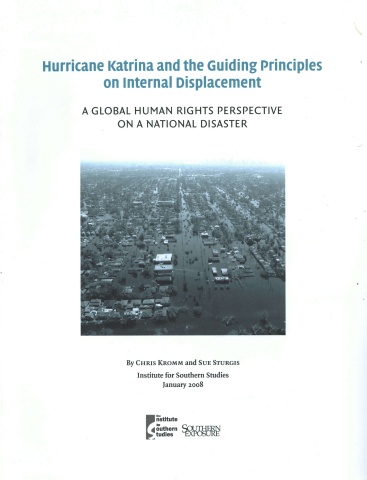Executive Summary

This article originally appeared in Southern Exposure Vol. 36 No. 1/2, "Hurricane Katrina and the Guiding Principles on Internal Displacement." Find more from the report here.
When Hurricane Katrina crashed into the U.S. Gulf Coast in August 2005, it precipitated one of the greatest episodes of internal displacement of U.S. residents in the country’s history. Over a million people were immediately forced from their homes and communities; today, tens of thousands of people from the Gulf Coast remain displaced across the nation.
The international community has a clear set of guidelines to protect the rights of people like those displaced by Hurricane Katrina: the United Nations Guiding Principles on Internal Displacement. Completed in 1998 by Dr. Francis Deng of the Sudan, the 30 Guiding Principles draw on existing international law and outline human rights protections for those displaced by events including natural disasters through three phases: before displacement, during displacement, and in the return, reintegration and resettlement of those displaced.
The Guiding Principles on Internal Displacement have been repeatedly affirmed by member nations of the U.N., including the United States. Indeed, the current U.S. presidential administration has called for “wider international recognition of the U.N. Guiding Principles on Internal Displacement as a useful framework for dealing with internal displacement.”
To date, the United States government has not acknowledged the relevance of the U.N. Guiding Principles to those persons displaced within the U.S. by Hurricane Katrina. Yet, as this report extensively documents, the Guiding Principles are directly applicable to this devastating disaster. Before, during and after Hurricane Katrina, U.S. policy failed to adhere to basic provisions of the Guiding Principles:
• Before Hurricane Katrina struck, the U.S. government did not take adequate measures to prevent wide-scale displacement of Gulf Coast residents, including coastal protection and maintaining sound storm defense systems such as the New Orleans levees.
• The U.S. government did not adequately protect the rights of Gulf Coast residents during displacement, failing in many cases to prevent discrimination against the poor, immigrants and people of color, and allowing children, the elderly, disabled persons and other vulnerable populations to be put in life-threatening situations.
• U.S. officials did not follow Guiding Principles related to humanitarian assistance, allowing partisan politics to skew relief and recovery assistance, failing to prevent abuses by private contractors and denying displaced persons access to aid from foreign governments.
• Lastly, the U.S. government has not successfully upheld the rights of those displaced by Hurricane Katrina to return, resettlement and reintegration in the Gulf Coast, effectively failing to address the need for affordable housing, health care access, and adequate employment that would enable displaced persons to come home.
Rather than viewing Hurricane Katrina as an exception from the U.N. Guiding Principles, U.S. officials should view the 2005 storm and its aftermath as proof of the Guiding Principles’ enduring value. The Guiding Principles provide a framework and guide for action that could greatly strengthen the U.S. government’s ability to quickly, adequately and equitably address the ongoing crises that continue to plague tens of thousands of people displaced by Hurricane Katrina.
Hopefully, the tragedy of Hurricane Katrina will provide the impetus for the United States to bring its policies in line with international standards for protecting those displaced by disasters. By fully incorporating the Guiding Principles into all aspects of U.S. disaster law, the U.S. government can ensure those displaced in the future may be spared from suffering the same troubling fate as the victims of Hurricane Katrina.